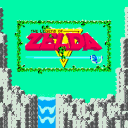Controlling Pd from another programme
@Worik Not sure what you are looking for.....
If you want to open a patch from the command line you can open Pd and a patch with a batch file...... in windows it would look something like this....
"C:\Program Files (x86)\pd\bin\pd.com" -path C:\Users\David\Desktop\PDMusic\Minx -path C:\Program_Files_(x86)\pd\extra\readanysf~\ -r 44100 -asio -nomidi -audioindev 20 -audiooutdev 15 -inchannels 32 -outchannels 22 -audiobuf 2 -blocksize 64 -callback -nosleep -open Minx_Run.pd
exit`
which on my system opens Minx_run.Pd and tells Pd where to find it........ \PdMusic\Minx
It also sets a load of command line switches...... to set up audio for this very specific instance (useful!).
There will be similar methods in other os's.
When you want to close the patch (and Pd) you kill the Dos window that the batch file created.
Messages can be sent to Pd to close a specific patch..... but another patch will have to be open (probably the one receiving the message) or Pd will terminate.
It can be done from within the patch but its complicated........ https://forum.pdpatchrepo.info/topic/11710/closing-patches-without-pd-crashing-hopefully-in-an-elegant-way ...... and not easy.
If you want to keep Pd open and control from another program........ then as @seb-harmonik.ar describes........ but the menuclose message might crash Pd if another patch (any patch) is not open........ https://forum.pdpatchrepo.info/topic/4063/close-patch-window-command-object
Anyway, it is cleaner to use a second patch to receive your messages and close the desired patch.
David.
Can't install purr-data on Manjaro
Hey, I'm trying to get purr-data to work on my fresh Manjaro XFCE install, but it does not work. Any help is greatly appreciated!
$ yay purr-data
7 aur/purrdata-faust 0.18-1 (+0 0.00)
Run Faust signal processors in Pd, Purr-Data version
6 aur/purrdata-pure 0.26-1 (+0 0.00)
Loader plugin for the Pure programming language, Purr-Data version
5 aur/purrdata-lv2plugin-git 25.e00f302-1 (+0 0.00)
LV2 plugin host for Pd, Purr-Data version
4 aur/purrdata-mdnsbrowser-git 8.88d2b0c-1 (+0 0.00)
Zeroconf service advertising and discovery for Pd, Purr-Data version
3 aur/purrdata-touchosc-git 44.443c793-1 (+0 0.00)
A TouchOSC MIDI bridge for Pd, Purr-Data version
2 aur/purr-data-git 2.12.0.r4366.6d94e10b-1 (+2 0.00)
Jonathan Wilkes' nw.js variant of Pd-L2Ork (git version)
1 aur/purr-data 2.12.0.r4346.aeb24d89-1 (+6 0.03) (Out-of-date: 2021-06-17)
Jonathan Wilkes' nw.js variant of Pd-L2Ork (git version)
==> Packages to install (eg: 1 2 3, 1-3 or ^4)
==> 2
:: There are 2 providers available for gconf:
:: Repository AUR
1) gconf 2) gconf-gtk2
Enter a number (default=1): ==>
:: Checking for conflicts...
:: Checking for inner conflicts...
[Aur:2] gconf-3.2.6+11+g07808097-10 purr-data-git-2.12.0.r4366.6d94e10b-1
2 gconf (Build Files Exist)
1 purr-data-git
==> Packages to cleanBuild?
==> [N]one [A]ll [Ab]ort [I]nstalled [No]tInstalled or (1 2 3, 1-3, ^4)
==> a
:: Deleting (1/1): /home/olav/.cache/yay/gconf
:: (1/2) Downloaded PKGBUILD: gconf
:: (2/2) Downloaded PKGBUILD: purr-data-git
2 gconf (Build Files Exist)
1 purr-data-git (Build Files Exist)
==> Diffs to show?
==> [N]one [A]ll [Ab]ort [I]nstalled [No]tInstalled or (1 2 3, 1-3, ^4)
==>
:: (1/2) Parsing SRCINFO: gconf
:: (2/2) Parsing SRCINFO: purr-data-git
==> Making package: gconf 3.2.6+11+g07808097-10 (Wed 09 Feb 2022 10:23:23 PM CET)
==> Retrieving sources...
-> Cloning gconf git repo...
Cloning into bare repository '/home/olav/.cache/yay/gconf/gconf'...
==> Making package: purr-data-git 2.12.0.r4366.6d94e10b-1 (Wed 09 Feb 2022 10:23:23 PM CET)
==> Retrieving sources...
-> Cloning purr-data-git git repo...
Cloning into bare repository '/home/olav/.cache/yay/purr-data-git/purr-data-git'...
remote: Enumerating objects: 21531, done.
remote: Enumerating objects: 63399, done.
remote: Counting objects: 100% (1852/1852), done.
remote: Compressing objects: 100% (641/641), done.
remote: Total 21531 (delta 0), reused 0 (delta 0), pack-reused 21531
Receiving objects: 100% (21531/21531), 10.88 MiB | 9.46 MiB/s, done.
Resolving deltas: 100% (17681/17681), done.1 KiB | 704.00 KiB/s
-> Found 01_xml-gettext-domain.patch388.01 KiB | 704.00 KiB/s
-> Found gconf-reload.patch
-> Found gconf-merge-schema
-> Found gconfpkg
-> Found gconf-install.hook
-> Found gconf-remove.hook
==> Validating source files with sha256sums...
gconf ... Skipped
01_xml-gettext-domain.patch ... Passed
gconf-reload.patch ... Passed
gconf-merge-schema ... Passed
gconfpkg ... Passed
gconf-install.hook ... Passed
gconf-remove.hook ... Passed
remote: Total 63399 (delta 1106), reused 1786 (delta 1052), pack-reused 61547
Receiving objects: 100% (63399/63399), 177.19 MiB | 5.71 MiB/s, done.
Resolving deltas: 100% (33721/33721), done.
-> Downloading nwjs-sdk-v0.24.4-linux-x64.tar.gz...
% Total % Received % Xferd Average Speed Time Time Time Current
Dload Upload Total Spent Left Speed
100 86.7M 100 86.7M 0 0 3966k 0 0:00:22 0:00:22 --:--:-- 8404k
==> Validating source files with md5sums...
purr-data-git ... Skipped
==> Validating source_x86_64 files with md5sums...
nwjs-sdk-v0.24.4-linux-x64.tar.gz ... Passed
==> Making package: gconf 3.2.6+11+g07808097-10 (Wed 09 Feb 2022 10:24:19 PM CET)
==> Checking runtime dependencies...
==> Checking buildtime dependencies...
==> Retrieving sources...
-> Updating gconf git repo...
Fetching origin
-> Found 01_xml-gettext-domain.patch
-> Found gconf-reload.patch
-> Found gconf-merge-schema
-> Found gconfpkg
-> Found gconf-install.hook
-> Found gconf-remove.hook
==> Validating source files with sha256sums...
gconf ... Skipped
01_xml-gettext-domain.patch ... Passed
gconf-reload.patch ... Passed
gconf-merge-schema ... Passed
gconfpkg ... Passed
gconf-install.hook ... Passed
gconf-remove.hook ... Passed
==> Removing existing $srcdir/ directory...
==> Extracting sources...
-> Creating working copy of gconf git repo...
Cloning into 'gconf'...
done.
Switched to a new branch 'makepkg'
==> Starting prepare()...
/home/olav/.cache/yay/gconf/PKGBUILD: line 30: patch: command not found
==> ERROR: A failure occurred in prepare().
Aborting...
-> error making: gconf
And
yay purr-data
7 aur/purrdata-faust 0.18-1 (+0 0.00)
Run Faust signal processors in Pd, Purr-Data version
6 aur/purrdata-pure 0.26-1 (+0 0.00)
Loader plugin for the Pure programming language, Purr-Data version
5 aur/purrdata-lv2plugin-git 25.e00f302-1 (+0 0.00)
LV2 plugin host for Pd, Purr-Data version
4 aur/purrdata-mdnsbrowser-git 8.88d2b0c-1 (+0 0.00)
Zeroconf service advertising and discovery for Pd, Purr-Data version
3 aur/purrdata-touchosc-git 44.443c793-1 (+0 0.00)
A TouchOSC MIDI bridge for Pd, Purr-Data version
2 aur/purr-data-git 2.12.0.r4366.6d94e10b-1 (+2 0.00)
Jonathan Wilkes' nw.js variant of Pd-L2Ork (git version)
1 aur/purr-data 2.12.0.r4346.aeb24d89-1 (+6 0.03) (Out-of-date: 2021-06-17)
Jonathan Wilkes' nw.js variant of Pd-L2Ork (git version)
==> Packages to install (eg: 1 2 3, 1-3 or ^4)
==> 2
:: There are 2 providers available for gconf:
:: Repository AUR
1) gconf 2) gconf-gtk2
Enter a number (default=1): ==>
:: Checking for conflicts...
:: Checking for inner conflicts...
[Aur:2] gconf-3.2.6+11+g07808097-10 purr-data-git-2.12.0.r4366.6d94e10b-1
2 gconf (Build Files Exist)
1 purr-data-git
==> Packages to cleanBuild?
==> [N]one [A]ll [Ab]ort [I]nstalled [No]tInstalled or (1 2 3, 1-3, ^4)
==> a
:: Deleting (1/1): /home/olav/.cache/yay/gconf
:: (1/2) Downloaded PKGBUILD: gconf
:: (2/2) Downloaded PKGBUILD: purr-data-git
2 gconf (Build Files Exist)
1 purr-data-git (Build Files Exist)
==> Diffs to show?
==> [N]one [A]ll [Ab]ort [I]nstalled [No]tInstalled or (1 2 3, 1-3, ^4)
==>
:: (1/2) Parsing SRCINFO: gconf
:: (2/2) Parsing SRCINFO: purr-data-git
==> Making package: gconf 3.2.6+11+g07808097-10 (Wed 09 Feb 2022 10:23:23 PM CET)
==> Retrieving sources...
-> Cloning gconf git repo...
Cloning into bare repository '/home/olav/.cache/yay/gconf/gconf'...
==> Making package: purr-data-git 2.12.0.r4366.6d94e10b-1 (Wed 09 Feb 2022 10:23:23 PM CET)
==> Retrieving sources...
-> Cloning purr-data-git git repo...
Cloning into bare repository '/home/olav/.cache/yay/purr-data-git/purr-data-git'...
remote: Enumerating objects: 21531, done.
remote: Enumerating objects: 63399, done.
remote: Counting objects: 100% (1852/1852), done.
remote: Compressing objects: 100% (641/641), done.
remote: Total 21531 (delta 0), reused 0 (delta 0), pack-reused 21531
Receiving objects: 100% (21531/21531), 10.88 MiB | 9.46 MiB/s, done.
Resolving deltas: 100% (17681/17681), done.1 KiB | 704.00 KiB/s
-> Found 01_xml-gettext-domain.patch388.01 KiB | 704.00 KiB/s
-> Found gconf-reload.patch
-> Found gconf-merge-schema
-> Found gconfpkg
-> Found gconf-install.hook
-> Found gconf-remove.hook
==> Validating source files with sha256sums...
gconf ... Skipped
01_xml-gettext-domain.patch ... Passed
gconf-reload.patch ... Passed
gconf-merge-schema ... Passed
gconfpkg ... Passed
gconf-install.hook ... Passed
gconf-remove.hook ... Passed
remote: Total 63399 (delta 1106), reused 1786 (delta 1052), pack-reused 61547
Receiving objects: 100% (63399/63399), 177.19 MiB | 5.71 MiB/s, done.
Resolving deltas: 100% (33721/33721), done.
-> Downloading nwjs-sdk-v0.24.4-linux-x64.tar.gz...
% Total % Received % Xferd Average Speed Time Time Time Current
Dload Upload Total Spent Left Speed
100 86.7M 100 86.7M 0 0 3966k 0 0:00:22 0:00:22 --:--:-- 8404k
==> Validating source files with md5sums...
purr-data-git ... Skipped
==> Validating source_x86_64 files with md5sums...
nwjs-sdk-v0.24.4-linux-x64.tar.gz ... Passed
==> Making package: gconf 3.2.6+11+g07808097-10 (Wed 09 Feb 2022 10:24:19 PM CET)
==> Checking runtime dependencies...
==> Checking buildtime dependencies...
==> Retrieving sources...
-> Updating gconf git repo...
Fetching origin
-> Found 01_xml-gettext-domain.patch
-> Found gconf-reload.patch
-> Found gconf-merge-schema
-> Found gconfpkg
-> Found gconf-install.hook
-> Found gconf-remove.hook
==> Validating source files with sha256sums...
gconf ... Skipped
01_xml-gettext-domain.patch ... Passed
gconf-reload.patch ... Passed
gconf-merge-schema ... Passed
gconfpkg ... Passed
gconf-install.hook ... Passed
gconf-remove.hook ... Passed
==> Removing existing $srcdir/ directory...
==> Extracting sources...
-> Creating working copy of gconf git repo...
Cloning into 'gconf'...
done.
Switched to a new branch 'makepkg'
==> Starting prepare()...
/home/olav/.cache/yay/gconf/PKGBUILD: line 30: patch: command not found
==> ERROR: A failure occurred in prepare().
Aborting...
-> error making: gconf
[olav@AMD-Computer ~]$ yay purr-data
7 aur/purrdata-faust 0.18-1 (+0 0.00)
Run Faust signal processors in Pd, Purr-Data version
6 aur/purrdata-pure 0.26-1 (+0 0.00)
Loader plugin for the Pure programming language, Purr-Data version
5 aur/purrdata-lv2plugin-git 25.e00f302-1 (+0 0.00)
LV2 plugin host for Pd, Purr-Data version
4 aur/purrdata-mdnsbrowser-git 8.88d2b0c-1 (+0 0.00)
Zeroconf service advertising and discovery for Pd, Purr-Data version
3 aur/purrdata-touchosc-git 44.443c793-1 (+0 0.00)
A TouchOSC MIDI bridge for Pd, Purr-Data version
2 aur/purr-data-git 2.12.0.r4366.6d94e10b-1 (+2 0.00)
Jonathan Wilkes' nw.js variant of Pd-L2Ork (git version)
1 aur/purr-data 2.12.0.r4346.aeb24d89-1 (+6 0.03) (Out-of-date: 2021-06-17)
Jonathan Wilkes' nw.js variant of Pd-L2Ork (git version)
==> Packages to install (eg: 1 2 3, 1-3 or ^4)
==> 2
:: There are 2 providers available for gconf:
:: Repository AUR
1) gconf 2) gconf-gtk2
Enter a number (default=1): ==> 2
:: Checking for conflicts...
:: Checking for inner conflicts...
[Aur:2] gconf-gtk2-3.2.6-5 purr-data-git-2.12.0.r4366.6d94e10b-1
2 gconf-gtk2 (Build Files Exist)
1 purr-data-git (Build Files Exist)
==> Packages to cleanBuild?
==> [N]one [A]ll [Ab]ort [I]nstalled [No]tInstalled or (1 2 3, 1-3, ^4)
==> a
:: Deleting (1/2): /home/olav/.cache/yay/gconf-gtk2
:: Deleting (2/2): /home/olav/.cache/yay/purr-data-git
:: (1/2) Downloaded PKGBUILD: purr-data-git
:: (2/2) Downloaded PKGBUILD: gconf-gtk2
2 gconf-gtk2 (Build Files Exist)
1 purr-data-git (Build Files Exist)
==> Diffs to show?
==> [N]one [A]ll [Ab]ort [I]nstalled [No]tInstalled or (1 2 3, 1-3, ^4)
==>
:: (1/2) Parsing SRCINFO: gconf-gtk2
:: (2/2) Parsing SRCINFO: purr-data-git
==> Making package: purr-data-git 2.12.0.r4366.6d94e10b-1 (Wed 09 Feb 2022 10:40:58 PM CET)
==> Retrieving sources...
==> Making package: gconf-gtk2 3.2.6-5 (Wed 09 Feb 2022 10:40:58 PM CET)
==> Retrieving sources...
-> Cloning purr-data-git git repo...
Cloning into bare repository '/home/olav/.cache/yay/purr-data-git/purr-data-git'...
-> Downloading GConf-3.2.6.tar.xz...
% Total % Received % Xferd Average Speed Time Time Time Current
Dload Upload Total Spent Left Speed
0 0 0 0 0 0 0 0 --:--:-- --:--:-- --:--:-- 0
100 1523k 100 1523k 0 0 1610k 0 --:--:-- --:--:-- --:--:-- 1610k
-> Found gconf-merge-schema
-> Found gconfpkg
-> Found gconf-reload.patch
-> Found gconf-install.hook
-> Found gconf-remove.hook
-> Found 01_xml-gettext-domain.patch
-> Found dbus-dontspew.patch
-> Found gsettings-data-convert-fix-invalid-schema-path.patch
==> Validating source files with sha256sums...
GConf-3.2.6.tar.xz ... Passed
gconf-merge-schema ... Passed
gconfpkg ... Passed
gconf-reload.patch ... Passed
gconf-install.hook ... Passed
gconf-remove.hook ... Passed
01_xml-gettext-domain.patch ... Passed
dbus-dontspew.patch ... Passed
gsettings-data-convert-fix-invalid-schema-path.patch ... Passed
remote: Enumerating objects: 63399, done.
remote: Counting objects: 100% (1852/1852), done.
remote: Compressing objects: 100% (641/641), done.
remote: Total 63399 (delta 1106), reused 1786 (delta 1052), pack-reused 61547
Receiving objects: 100% (63399/63399), 177.19 MiB | 9.76 MiB/s, done.
Resolving deltas: 100% (33721/33721), done.
-> Downloading nwjs-sdk-v0.24.4-linux-x64.tar.gz...
% Total % Received % Xferd Average Speed Time Time Time Current
Dload Upload Total Spent Left Speed
100 86.7M 100 86.7M 0 0 11.7M 0 0:00:07 0:00:07 --:--:-- 14.4M
==> Validating source files with md5sums...
purr-data-git ... Skipped
==> Validating source_x86_64 files with md5sums...
nwjs-sdk-v0.24.4-linux-x64.tar.gz ... Passed
==> Making package: gconf-gtk2 3.2.6-5 (Wed 09 Feb 2022 10:41:26 PM CET)
==> Checking runtime dependencies...
==> Checking buildtime dependencies...
==> Retrieving sources...
-> Found GConf-3.2.6.tar.xz
-> Found gconf-merge-schema
-> Found gconfpkg
-> Found gconf-reload.patch
-> Found gconf-install.hook
-> Found gconf-remove.hook
-> Found 01_xml-gettext-domain.patch
-> Found dbus-dontspew.patch
-> Found gsettings-data-convert-fix-invalid-schema-path.patch
==> Validating source files with sha256sums...
GConf-3.2.6.tar.xz ... Passed
gconf-merge-schema ... Passed
gconfpkg ... Passed
gconf-reload.patch ... Passed
gconf-install.hook ... Passed
gconf-remove.hook ... Passed
01_xml-gettext-domain.patch ... Passed
dbus-dontspew.patch ... Passed
gsettings-data-convert-fix-invalid-schema-path.patch ... Passed
==> Removing existing $srcdir/ directory...
==> Extracting sources...
-> Extracting GConf-3.2.6.tar.xz with bsdtar
==> Starting prepare()...
/home/olav/.cache/yay/gconf-gtk2/PKGBUILD: line 39: patch: command not found
==> ERROR: A failure occurred in prepare().
Aborting...
-> error making: gconf-gtk2
Why does Pd look so much worse on linux/windows than in macOS?
Howdy all,
I just found this and want to respond from my perspective as someone who has spent by now a good amount of time (paid & unpaid) working on the Pure Data source code itself.
I'm just writing for myself and don't speak for Miller or anyone else.
Mac looks good
The antialiasing on macOS is provided by the system and utilized by Tk. It's essentially "free" and you can enable or disable it on the canvas. This is by design as I believe Apple pushed antialiasing at the system level starting with Mac OS X 1.
There are even some platform-specific settings to control the underlying CoreGraphics settings which I think Hans tried but had issues with: https://github.com/pure-data/pure-data/blob/master/tcl/apple_events.tcl#L16. As I recall, I actually disabled the font antialiasing as people complained that the canvas fonts on mac were "too fuzzy" while Linux was "nice and crisp."
In addition, the last few versions of Pd have had support for "Retina" high resolution displays enabled and the macOS compositor does a nice job of handling the point to pixel scaling for you, for free, in the background. Again, Tk simply uses the system for this and you can enable/disable via various app bundle plist settings and/or app defaults keys.
This is why the macOS screenshots look so good: antialiasing is on and it's likely the rendering is at double the resolution of the Linux screenshot.
IMO a fair comparison is: normal screen size in Linux vs normal screen size in Mac.
Nope. See above. 
It could also just be Apple holding back a bit of the driver code from the open source community to make certain linux/BSD never gets quite as nice as OSX on their hardware, they seem to like to play such games, that one key bit of code that is not free and you must license from them if you want it and they only license it out in high volume and at high cost.
Nah. Apple simply invested in antialiasing via its accelerated compositor when OS X was released. I doubt there are patents or licensing on common antialiasing algorithms which go back to the 60s or even earlier.
tkpath exists, why not use it?
Last I checked, tkpath is long dead. Sure, it has a website and screenshots (uhh Mac OS X 10.2 anyone?) but the latest (and only?) Sourceforge download is dated 2005. I do see a mirror repo on Github but it is archived and the last commit was 5 years ago.
And I did check on this, in fact I spent about a day (unpaid) seeing if I could update the tkpath mac implementation to move away from the ATSU (Apple Type Support) APIs which were not available in 64 bit. In the end, I ran out of energy and stopped as it would be too much work, too many details, and likely to not be maintained reliably by probably anyone.
It makes sense to help out a thriving project but much harder to justify propping something up that is barely active beyond "it still works" on a couple of platforms.
Why aren't the fonts all the same yet?!
I also despise how linux/windows has 'bold' for default
I honestly don't really care about this... but I resisted because I know so many people do and are used to it already. We could clearly and easily make the change but then we have to deal with all the pushback. If you went to the Pd list and got an overwhelming consensus and Miller was fine with it, then ok, that would make sense. As it was, "I think it should be this way because it doesn't make sense to me" was not enough of a carrot for me to personally make and support the change.
Maybe my problem is that I feel a responsibility for making what seems like a quick and easy change to others? 
And this view is after having put an in ordinate amount of time just getting (almost) the same font on all platforms, including writing and debugging a custom C Tcl extension just to load arbitrary TTF files on Windows.
Why don't we add abz, 123 to Pd? xyzzy already has it?!
What I've learned is that it's much easier to write new code than it is to maintain it. This is especially true for cross platform projects where you have to figure out platform intricacies and edge cases even when mediated by a common interface like Tk. It's true for any non-native wrapper like QT, WXWidgets, web browsers, etc.
Actually, I am pretty happy that Pd's only core dependencies a Tcl/Tk, PortAudio, and PortMidi as it greatly lowers the amount of vectors for bitrot. That being said, I just spent about 2 hours fixing the help browser for mac after trying Miller's latest 0.52-0test2 build. The end result is 4 lines of code.
For a software community to thrive over the long haul, it needs to attract new users. If new users get turned off by an outdated surface presentation, then it's harder to retain new users.
Yes, this is correct, but first we have to keep the damn thing working at all.  I think most people agree with you, including me when I was teaching with Pd.
I think most people agree with you, including me when I was teaching with Pd.
I've observed, at times, when someone points out a deficiency in Pd, the Pd community's response often downplays, or denies, or gets defensive about the deficiency. (Not always, but often enough for me to mention it.) I'm seeing that trend again here. Pd is all about lines, and the lines don't look good -- and some of the responses are "this is not important" or (oid) "I like the fact that it never changed." That's... thoroughly baffling to me.
I read this as "community" = "active developers." It's true, some people tend to poo poo the same reoccurring ideas but this is largely out of years of hearing discussions and decisions and treatises on the list or the forum or facebook or whatever but nothing more. In the end, code talks, even better, a working technical implementation that is honed with input from people who will most likely end up maintaining it, without probably understanding it completely at first.
This was very hard back on Sourceforge as people had to submit patches(!) to the bug tracker. Thanks to moving development to Github and the improvement of tools and community, I'm happy to see the new engagement over the last 5-10 years. This was one of the pushes for me to help overhaul the build system to make it possible and easy for people to build Pd itself, then they are much more likely to help contribute as opposed to waiting for binary builds and unleashing an unmanageable flood of bug reports and feature requests on the mailing list.
I know it's not going to change anytime soon, because the current options are a/ wait for Tcl/Tk to catch up with modern rendering or b/ burn Pd developer cycles implementing something that Tcl/Tk will(?) eventually implement or c/ rip the guts out of the GUI and rewrite the whole thing using a modern graphics framework like Qt. None of those is good (well, c might be a viable investment in the future -- SuperCollider, around 2010-2011, ripped out the Cocoa GUIs and went to Qt, and the benefits have been massive -- but I know the developer resources aren't there for Pd to dump Tcl/Tk).
A couple of points:
-
Your point (c) already happened... you can use Purr Data (or the new Pd-L2ork etc). The GUI is implemented in Node/Electron/JS (I'm not sure of the details). Is it tracking Pd vanilla releases?... well that's a different issue.
-
As for updating Tk, it's probably not likely to happen as advanced graphics are not their focus. I could be wrong about this.
I agree that updating the GUI itself is the better solution for the long run. I also agree that it's a big undertaking when the current implementation is essentially still working fine after over 20 years, especially since Miller's stated goal was for 50 year project support, ie. pieces composed in the late 90s should work in 2040. This is one reason why we don't just "switch over to QT or Juce so the lines can look like Max." At this point, Pd is aesthetically more Max than Max, at least judging by looking at the original Ircam Max documentation in an archive closet at work. 
A way forward: libpd?
I my view, the best way forward is to build upon Jonathan Wilke's work in Purr Data for abstracting the GUI communication. He essentially replaced the raw Tcl commands with abstracted drawing commands such as "draw rectangle here of this color and thickness" or "open this window and put it here."
For those that don't know, "Pd" is actually two processes, similar to SuperCollider, where the "core" manages the audio, patch dsp/msg graph, and most of the canvas interaction event handling (mouse, key). The GUI is a separate process which communicates with the core over a localhost loopback networking connection. The GUI is basically just opening windows, showing settings, and forwarding interaction events to the core. When you open the audio preferences dialog, the core sends the current settings to the GUI, the GUI then sends everything back to the core after you make your changes and close the dialog. The same for working on a patch canvas: your mouse and key events are forwarded to the core, then drawing commands are sent back like "draw object outline here, draw osc~ text here inside. etc."
So basically, the core has almost all of the GUI's logic while the GUI just does the chrome like scroll bars and windows. This means it could be trivial to port the GUI to other toolkits or frameworks as compared to rewriting an overly interconnected monolithic application (trust me, I know...).
Basically, if we take Jonathan's approach, I feel adding a GUI communication abstraction layer to libpd would allow for making custom GUIs much easier. You basically just have to respond to the drawing and windowing commands and forward the input events.
Ideally, then each fork could use the same Pd core internally and implement their own GUIs or platform specific versions such as a pure Cocoa macOS Pd. There is some other re-organization that would be needed in the C core, but we've already ported a number of improvements from extended and Pd-L2ork, so it is indeed possible.
Also note: the libpd C sources are now part of the pure-data repo as of a couple months ago...
Discouraging Initiative?!
But there's a big difference between "we know it's a problem but can't do much about it" vs "it's not a serious problem." The former may invite new developers to take some initiative. The latter discourages initiative. A healthy open source software community should really be careful about the latter.
IMO Pd is healthier now than it has been as long as I've know it (2006). We have so many updates and improvements over every release the last few years, with many contributions by people in this thread. Thank you! THAT is how we make the project sustainable and work toward finding solutions for deep issues and aesthetic issues and usage issues and all of that.
We've managed to integrate a great many changes from Pd-Extended into vanilla and open up/decentralize the externals and in a collaborative manner. For this I am also grateful when I install an external for a project.
At this point, I encourage more people to pitch in. If you work at a university or institution, consider sponsoring some student work on specific issues which volunteering developers could help supervise, organize a Pd conference or developer meetup (this are super useful!), or consider some sort of paid residency or focused project for artists using Pd. A good amount of my own work on Pd and libpd has been sponsored in many of these ways and has helped encourage me to continue.
This is likely to be more positive toward the community as a whole than banging back and forth on the list or the forum. Besides, I'd rather see cool projects made with Pd than keep talking about working on Pd.
That being said, I know everyone here wants to see the project continue and improve and it will. We are still largely opening up the development and figuring how to support/maintain it. As with any such project, this is an ongoing process.
Out
Ok, that was long and rambly and it's way past my bed time.
Good night all.
Dynamically patched vslider with local send symbol
@oid This is a problem from my 2nd ever dynamic patch, so I wouldn't try to read deep meaning into my questions  . Like my first dynamic patch, it's just a patch that generates the repetitive, static parts of other patches--a way to reduce the tedium of having to edit multiple send/receive names by hand, that's all. I'm expecting to have to cut and paste from this helper patch into the patch I'm really trying to write, so the value of $0 in the generating patch is irrelevant. Is that reasonable? In a patch that needed its UI to be dynamically generated, your way would make total sense, but I'm def not there yet. Also, regarding your other topic, I think the message that dynamically generates a vslider can itself be static, so I'm not sure that add2 technique is applicable.
. Like my first dynamic patch, it's just a patch that generates the repetitive, static parts of other patches--a way to reduce the tedium of having to edit multiple send/receive names by hand, that's all. I'm expecting to have to cut and paste from this helper patch into the patch I'm really trying to write, so the value of $0 in the generating patch is irrelevant. Is that reasonable? In a patch that needed its UI to be dynamically generated, your way would make total sense, but I'm def not there yet. Also, regarding your other topic, I think the message that dynamically generates a vslider can itself be static, so I'm not sure that add2 technique is applicable.
@ingox OK, now I'm getting the same results as you, which is odd because the patch I've presented is just a small example from a larger patch that was giving me trouble. After discovering the $\$0 syntax I applied it to that larger patch, saw that it too was working, and then posted this topic. But now my larger patch is broken, which makes me believe that the system is behaving differently since running your patches (and that I wasn't previously hallucinating). But that can't be true, right?
So here's another small patch to demonstrate how my larger patch is (now) broken: dynamicPatchVerticalSlider2.pd
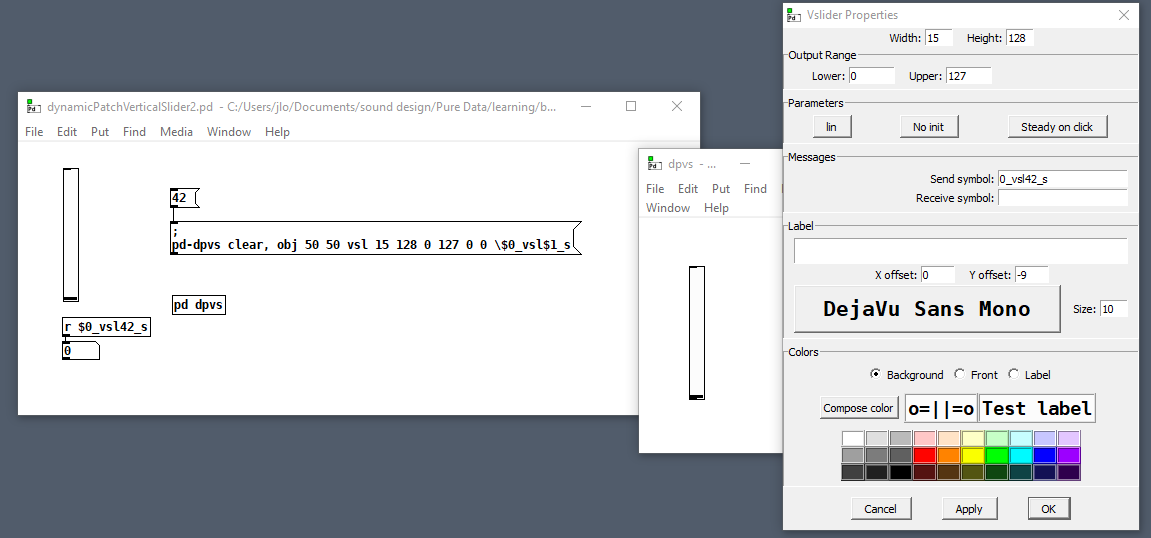
See how \$0 is just generating a 0 in the send symbol? When I save and reload it to test the fader (which doesn't work), the backslash gets dropped from the creation message!
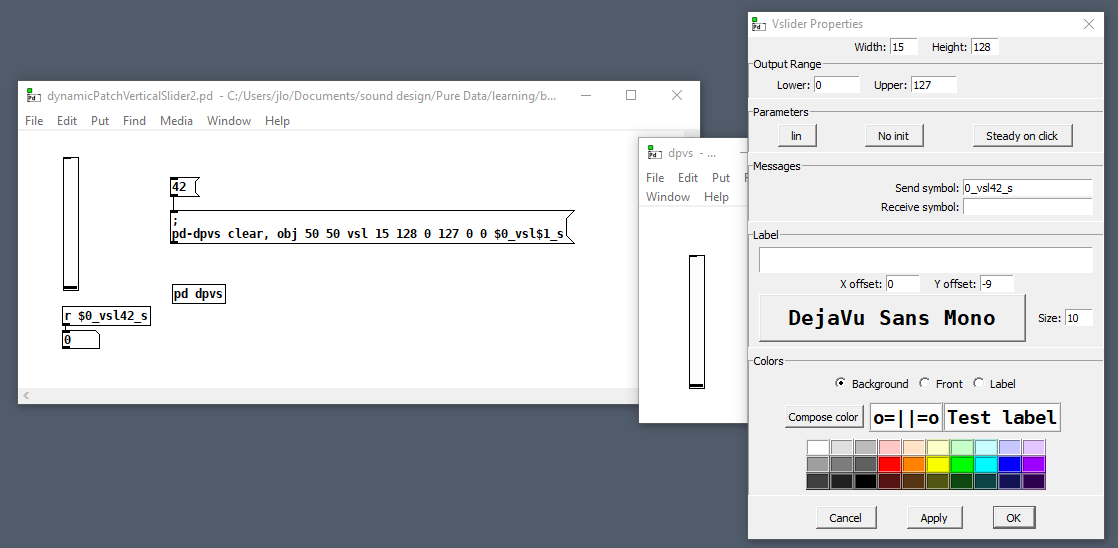
So next I try falling back to the syntax I got working earlier, and the generated vslider send symbol looks good
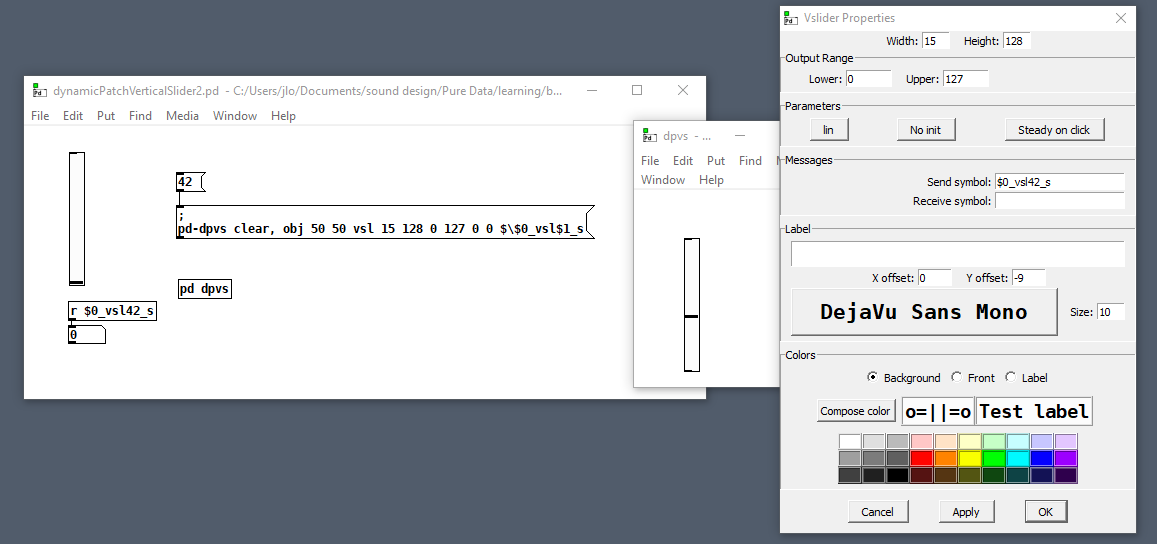
and on reloading it I can confirm that it is good, but now I can't use my generating patch because $1 is backslash escaped!
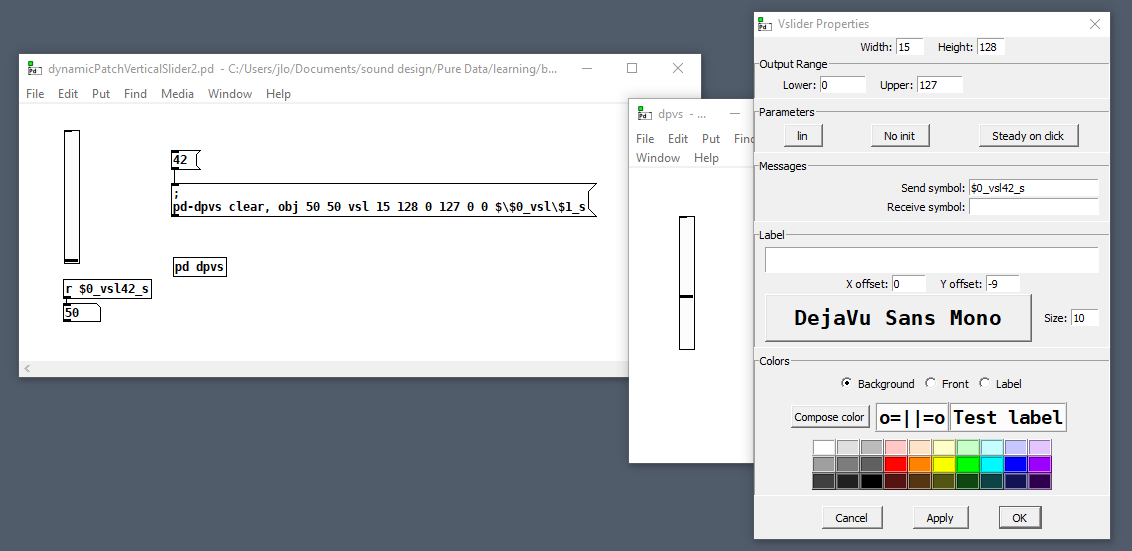
Paths and organizing .pd files for use.
@raynovich I use the [declare] object instead of paths, keeps the paths list shorter and more manageable and also gives you a nice list of dependencies right in the patch so you never have to wade through the patch trying to figure out what it needs if you want to share the patch or copy it to a different machine. If you need a sub-folder you just declare the sub-folder. Use absolute paths when you declare, this way you can move the patch and it will still find what it needs. I generally have a sub-patch in each patch for declares and I avoid declaring folders, just declare the abstraction directly so I never have to try and figure out which abstractions a given patch uses, just open the declare sub-patch and it is all there. In my pd folder I have all my current patches, an abstractions folder, a folder for patches I am not currently working on and a folder for reference patches. I do my best to avoid making abstractions which only have use in a single patch, I will figure out how to generalize it to make it more useful for other patches so it can live in my abstraction folder without cluttering it up and helps avoid needing folders for patches. When a patch must have a folder it goes in the pd directory with the patch and I declare it instead of keeping the patch in it's own directory, this is mainly to minimize having to navigate folders as much.
Using [declare] to explicitly declare individual abstractions also makes it easier to clean your abstraction folder, a simple shell script can check for abstractions which are not used by any patch or ones that just get used by a single patch so you can check them out to see if they are worth keeping or should be moved too the folder of that one patch which uses them.
Few questions about oversampling
Hi,
About a year ago I started to learn a bit pure data in order to create a patch that would act as a groovebox and that should perform on limited cpu resources since I want it to run on a raspberry pi. First I tried to make somekind of fork of the Martin Brinkmann groovebox patch, even if it allowed me to learn a lot about data flow I didn't went to the core of the patch tweaking with sound generation. This led me to end this attempt at forking MNB groovebox patch because even if I could seperate GUI stuff from sound generation and run it on different thread ect... I couldn't go further in optimization in order to reduce the cpu use.
Then a few weeks ago I decided to start again from scratch my project and this time I wanted to be more patient and learn anything needed in order to be capable of optimizing my patch as much as possible. After making a functional drum machine which runs at 2/3% of cpu with 8 different tracks, 126 steps sequencer, a bit of fx ect... I tried to find synths that would opperate well aside the drum machine. And I basicly didn't find any patch that wouldn't use massive amount of cpu time. So I created my own synths, nothing incredible but I'm happy with what I got, though I noticed some aliasing. I read a bit the floss manual about anti aliasing and apply the method used in the manual(http://write.flossmanuals.net/pure-data/antialiasing/), it work well but my synths almost trippled their cpu use, even if I put all my oscilators in the same subpatch in order to use only one instance of oversampling.
I didn't tried to oversample it less than 16 time but since oversampling is so cpu intensive I'm wondering if there's no other option in order to get a good sound definition at a lower cpu cost. I'm already using banlimited waveform so I don't know what I could do in order to limit the aliasing, especialy for my fm patch where bandlimited waveform isn't very useful in order to reduce aliasing.
Since I want to have at least 4 synth track with some at least one synth having 5 voice polyphony I want to know what the best thing to do. Letting FM aside for this project and use switch~ for oversampling 2 or 4 time my synths that use bandlimited waveform ? Or should I try to run different instances of pd for each synth and controling it from a gui/control patch with netsend(though it wouldn't bring down the cpu use at least it would provide somekind of multithreading for my patch) ? Or is there another way to get some antiliasing ? Or should I review lower my expectation because there is no solution that could provide a decent antialiasing for 4 or more synth running at the same time with a low cpu use in pure data in 2021.
Thanks to everyone that would read my topic and try to give some advice in order to get the best antialising/low cpu use solution.
Closing patches without Pd crashing, hopefully in an elegant way...
EUREKA! I solved the following problem:
Problem: provide a mechanism for allowing patches to self-close without Pd crashing.
Requirements: (1) uses only Pd vanilla; (2) action to close patch starts on the very patch that will be closed.
Solution: copy patch killer.pd in the same folder as the patch to be closed, and send a message containing ";pd open killer.pd <dir>;kill_me symbol patch_to_be_closed.pd":
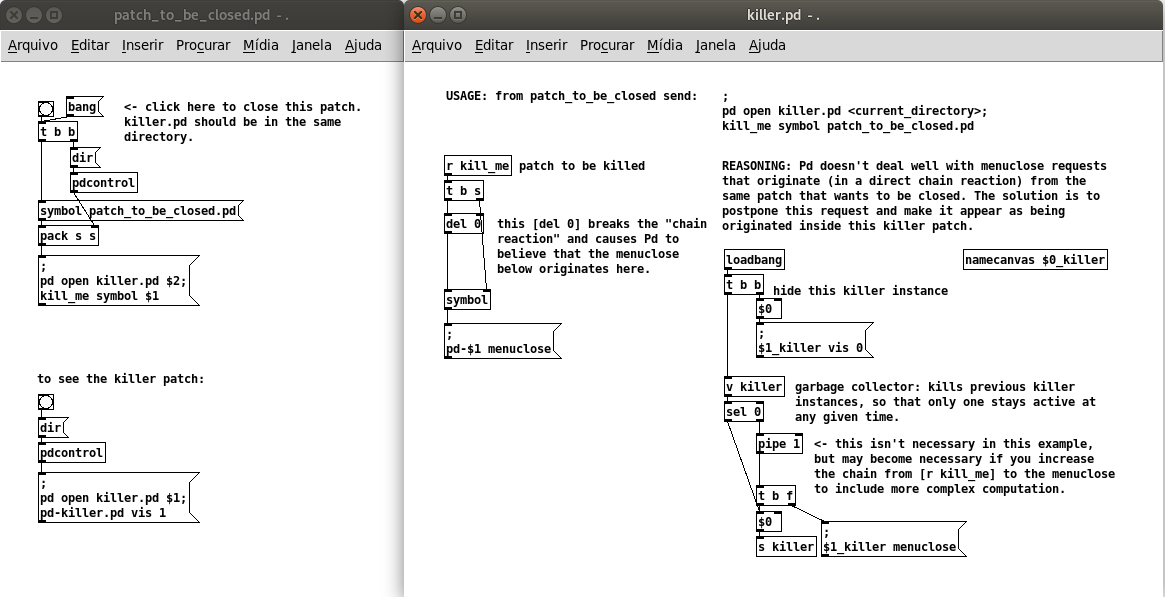
killer.pd
patch_to_be_closed.pd
Comments: (documented in the killer patch) Pd doesn't deal well with menuclose requests that originate (in a direct chain reaction) from the same patch that wants to be closed, so a separate killer patch is needed, which can be opened by the same patch requesting to be closed. In order to break the direct chain reaction, the solution is to postpone this request and make it appear as being originated inside the killer patch. This is done by storing the received symbol and delaying the message menuclose by 0 ms, which is enough to issue a new chain of events. The killer patch stays alive (but invisible), and any new instances of the killer patch will silently kill the previous instances so that only one killer patch is alive at any given time. [EDIT: I included a safeguard [pipe 1] in the killer patch, check the inline comments]. This implementation fixes the problems with my previous solution and also with the 3-patches method by @ingox, both of which didn't work through a send/receive pair. It also does not depend on dynamic patching.
This has been tested in Pd 0.50-2 and Ubuntu 20.04. I appreciate feedback to confirm if it works in other platforms/versions.
@whale-av Thanks again David for the suggestions (hcs, mouse clicks)! I wasn't too keen on the idea of depending on external libraries, and I also had to abandom the idea of having the killer patch embedded in the patch to be closed.
Minx
Xmas 2012 was pretty good.
I still had never heard of Pure Data or OSC.
I was still productive, just getting my computer booted for emails, sound and video editing etc.
And then it happened.
I was asked for a complete wireless stage monitoring system with control by the musicians, and the manufacturers for the professional market had nothing to offer at that time.
Data flow programming was made for me. I love it, and I cannot leave it alone.
I might not be very good at it, but I no longer do anything else.
Anyway, here is the current state of the project, for anyone who might find it useful.
It took longer to get around to writing the manual than it did to write the patches.
It is a fairly extreme example of the power of dynamic patching.
The patch is always dynamically built to the specification required.
There is some dynamic patching while it is running..... to change input and output routing.
The pronounced demise of extended forced an attempt at compliance with vanilla.
Every problem was resolved except the cookbook calcs for [biquad~] and I gave up and forgot about the conversion to Vanilla..
I had even built a dynamically created abstraction to replace [matrix~] from the cyclone library.
But now the ggee library is available through Deken for 64-bit Pd...
The Vanilla version has not been so extensively tested as the Extended version.
Minx could be used by a band for headphone monitoring in rehearsal too.
If you add a multitrack recorder/player it could be used for solo practice and a virtual soundcheck as well.
Anyway, here it is in its current state.
Extended...... Minx Extended.zip
Vanilla (requires ggee library)..... Minx Vanilla.zip
The Manual (written for the Extended version but valid for Vanilla)..... Minx Manual and Readme.zip
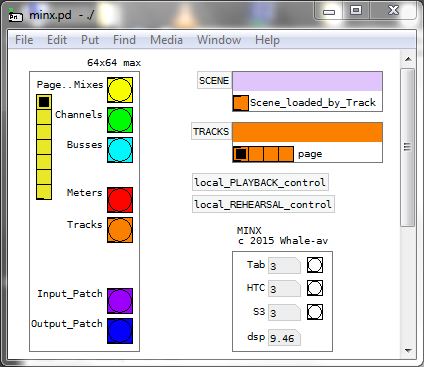
Batch files are a good way to start Pd as all the parameters can be set for the project.
They are not absolutely necessary, but your patch can be opened with different settings for different situations.
I have put a demo SCENE file (for 10 inputs / six outputs) and a demo TRACKS file so you can see it working straight away.
I have included only one short track so as to reduce download bloat...... the Manual is already more than twice as big as the patch....!
If you don't want to use TouchOSC then I am sure the remote controls can be built with Mobmuplat.
If you don't have a soundcard with 10 inputs and 6 outputs you will see some "connection failed" messages in the terminal...... but they are unimportant....... the patch will just be working for the inputs and outputs that you have.
David.
data structures - xy-pad in value range 0-1
oh, great - thanks for all the replies! 
@ingox
Is it possible that you are using @Balwyn's xy-patch
no, not this patch, but yeah, i was inspired by another patch i found here somewhere in the forum... don't remembr exactly which one, but this got me started - i'm still trying to get into data structures, which is quite hard sometimes, so it's really good to have some patches to get started with...
It is that data structures get an invisible dragging area of 10 or 12 pixels squared. This is not documented and i don't remember the exact circumstances how the area is created. But the dragging area is unfortunately independent from the displayed form in size, so a bigger form can not be dragged at any point. Hope that helps a little bit.
yeah, i was afraid, this could be the answer! 
@Balwyn said:
@toxonic just multiplying the outputs by 0.01 gives the same result
yes, correct - it's not a big deal to convert the output into any range, but i just hoped to keep things simple.... 
@Balwyn said:
@toxonic You may get some insight into using the hotspot without a pointer with this offering I uploaded a few years ago,
https://forum.pdpatchrepo.info/uploads/files/1498974324729-xydrag.zip
The template is a little confronting but shows that by using just one xy pair (px and py) multiple nodes can be created using scaling and constraining (eg px(-100:100)(20:20) py(-100:100)(-20:-20)).
the x and y output from the grid is interpreted as greater or smaller than the previous which activates a plus or minus counter for the output values
oh, sweet jesus, this is a huge template within the [pd template] patch.... i have to go to work now, but i'll try to figure it out, when i'm at home again! 
thank you all for your answers, great forum! 
Wind and Rain....
after years of "pd-abstinence" and not doing anything dsp-related at all, i built a new patch in the past few days, which is roughly inspired by "space drones" from NI Reaktor. the patch can be used to create wind- and rain-like soundscapes or something like this... 
my main intention was to get into pd again and learn a bit about data structures to visualize sound particles and figure out, how the [clone] object works, which - afaik - was'n available last time i patched with pd.
i built a similar patch years ago, but i remember that voice management was a real pain in the ass, so i had to use dynamic patching for this, etc.
now, there's still a lot to do:
- adjust parameters and their relations
- gain compensation for high filter q
- enhance visualisation of sound particles
- and a lot more....
you will need to get some external libraries in order to get the patch working, i guess mainly zexy, cyclone and else.... there's an additional compressor external (t_comp~) in the abs-folder which is the stereo compressor from the FAUST libraries. since i'm on linux i compiled the external for osx and win32 via the FAUST online editor and couldn't test them afterwards - i hope they work for you... EDIT: here's the DSP file, for those who want to compile it with Faust Works or whatever....  t_comp.dsp
t_comp.dsp
however, suggestions on how to enhance the patch are welcome!  thanks in advance for trying!
thanks in advance for trying! 
EDITS:
-
winds2_r001.zip
a few changes in signal flow, added a master volume with vu meter, fixed a bug (double triggered notes), put reverb after compressor -
winds2_r002.zip
now in one-window-mode


